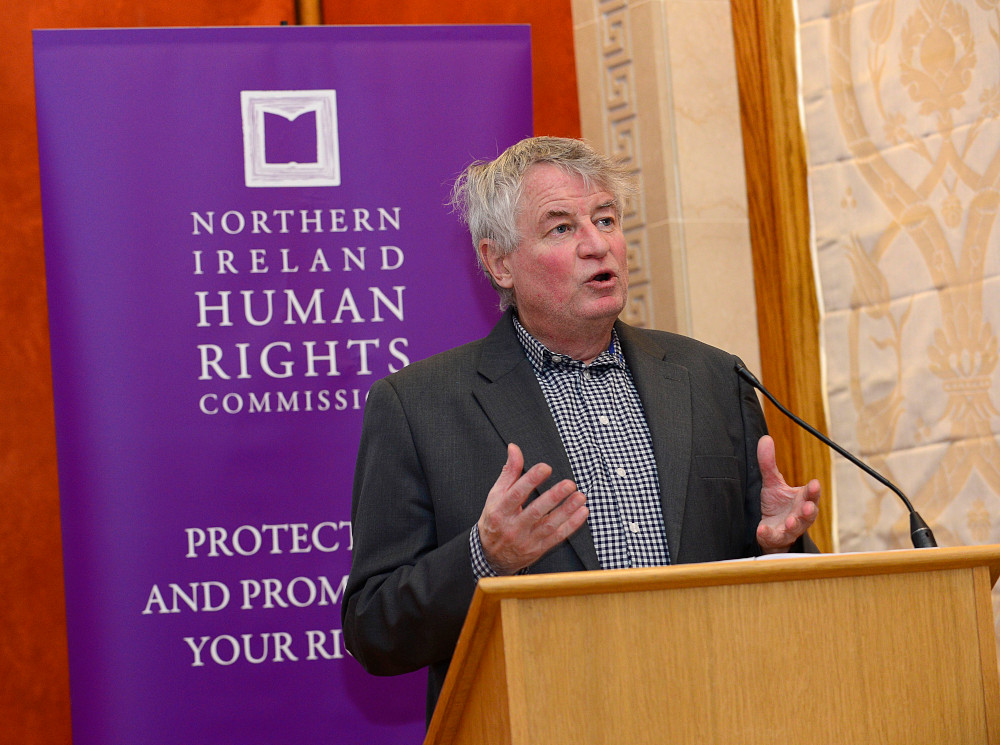Les Allamby: Human rights crucial as ever as Northern Ireland navigates Covid and Brexit

Les Allamby, chief commissioner of the Northern Ireland Human Rights Commission
Les Allamby, the outgoing chief commissioner of the Northern Ireland Human Rights Commission (NIHRC), reflects on the human rights landscape in Northern Ireland ahead of the end of his term early next week.
Human rights remains a contested space, both publicly and politically. Nonetheless, as I reflect on completing my term as the chief commissioner of the Northern Ireland Human Rights Commission, there has never been a greater public discourse around rights, individual and collective – even though on some occasions, I struggle to recognise the international human rights standards being invoked in some arguments. Nonetheless, the embracing of rights in public debate is a positive sign.
My tenure has seen important political changes. The UK government’s decision to hold a referendum on continuing membership of the EU and the decision to then leave has had momentous consequences, not all of which have been fully realised to date.
The Commission took no view on how people should have voted, but once the die was cast, we worked diligently with our counterpart, the Irish Human Rights and Equality Commission, to ensure that human rights and equality were protected as effectively as possible. Critical to our approach was the Good Friday Agreement and its underpinning by human rights, equality and issues of citizenship and identity.
In discussions in Brussels with the UK government, we raised concerns around the potential for difficulties if the European Commission’s proposal that the retention of EU law rights for those who identify as Irish in Northern Ireland were not matched for those who identify as British. Moreover, such an approach would run counter to the spirit and intention of the Good Friday Agreement.
The reply, bordering on the insouciant, was that an inevitable ‘asymmetry of rights’ will occur with little apparent regard for the actual ramifications. In practice, the UK government’s commitment to ‘no diminution of rights in the Rights, Safeguards and Equality of Opportunity section of the Belfast (Good Friday) Agreement’ in the Ireland/Northern Ireland protocol has proved relatively uncontroversial, while perceived differences around trade and economic activity have been much more problematic.
The pandemic has also thrown the question of human rights into sharp relief. Some human rights are absolute and must be adhered to regardless of the circumstances, including the right to life and freedom from torture and inhuman and degrading treatment under Articles 2 and 3 of the European Convention on Human Rights respectively. Other rights can, however, be qualified, for example during a public health emergency.
In effect, rights can be curtailed; consequently, at the height of the pandemic, freedom of movement, the right to see family and friends, and visit loved ones in hospital and care homes, run a business or go to work were all severely restricted. Under human rights approaches, the curb on such rights must be no more than required to meet any public health or other emergency, be set out in law and offer redress, tackle a legitimate aim and be proportionate. As we eventually emerge from the pandemic, most things will return to normal and we must be vigilant to ensure that includes all the human rights that were, after all, hard fought for initially.
One of the challenges for both parts of the island is managing the economic recovery and how it is paid for. In Northern Ireland, under the UK government, the 10 years preceding the pandemic were marked by the rhetoric from the (then) Chancellor of the Exchequer George Osborne of ‘fixing the roof while the sun is shining’ and substantial reductions in public expenditure.
The Commission published a Cumulative Impact Assessment on the effect of tax and social security policies on households between 2010 and 2020. In practice, the changes had the most adverse impact on low-income households, particularly women, lone parents and households with a child or adult with a disability. Further analysis on the effect of public expenditure changes on households and families will be published in the autumn. The analysis suggests that any economic recovery needs to be aimed at those best able to bear the financial burden.
A large number of outstanding social issues remain to be fixed including access to healthcare, housing, special education needs support and the removal of the additional £20 a week paid to claimants of Universal Credit during the pandemic. As a result, the work of the Fiscal Commission and the examination of tax-varying powers for the Northern Ireland Executive is particularly urgent. During my tenure, the need to embrace economic and social rights issues has come to the fore, reflecting a desire to ensure the work of the Commission resonates with the concerns of people’s everyday lives.
One area where little progress has been made has been in producing and commencing an approach to the legacy of conflict. The Stormont House Agreement agreed in 2014 has been mothballed and replaced with an approach which merges truth-telling into investigations with no prospect of an outcome holding anyone accountable in law.
In 2017, following a Westminster Defence Select Committee report recommending a statute of limitations for military personnel as one option for the moving forward, the Northern Ireland Office sought the Commission’s advice – namely, that such an approach is neither compatible with human rights law nor international human rights standards. That advice stands today.
The paper issued on legacy last month illustrates a worrying trend. At times, the UK government has started to take an almost ‘laissez-faire’ approach to the human rights standards it has agreed to. From being willing to break international agreements for a ‘limited and specified’ period within the Internal Markets Bill, to not addressing how a statute of limitations would constitute an effective investigation under the requirements of the right to life under the European Convention on Human Rights, the UK government is knowingly not meeting its human rights obligations.
The contrast between the UK government’s desire to play a positive and progressive role in promoting human rights on the international stage with its approach in its own backyard is marked. From experience of operating on the international stage, this will not go unnoticed by other governments. As a result, it will impair the UK’s influence across the globe, including in places where human rights records leave a great deal more to be desired than in the United Kingdom.
One of the first and last issues to come across my desk has been reproductive rights for women and, in particular, access to abortion services locally. Both parts of Ireland have made great strides. Northern Ireland can now offer a meaningful and accessible abortion service locally to woman, albeit imperfect, patchy and one which is not centrally commissioned and funded. A legal and political war of attrition continues which ill-serves women who should have access to services regardless of the choices they make.
I am confident the Commission will stay the course based on the international and domestic human rights standards. Nonetheless, developments have moved further and faster than anyone could have envisaged a decade ago. One of the catalysts for the change in Northern Ireland was the inquiry into abortion by the Convention on the Elimination of Discrimination Against Women alongside legal challenges and the powerful voices of women telling their stories. Enshrining the recommendations of a UN treaty monitoring body inquiry in full into Westminster legislation was a global first – something I never expected to be able to write when I started as Chief Commissioner seven years ago.








